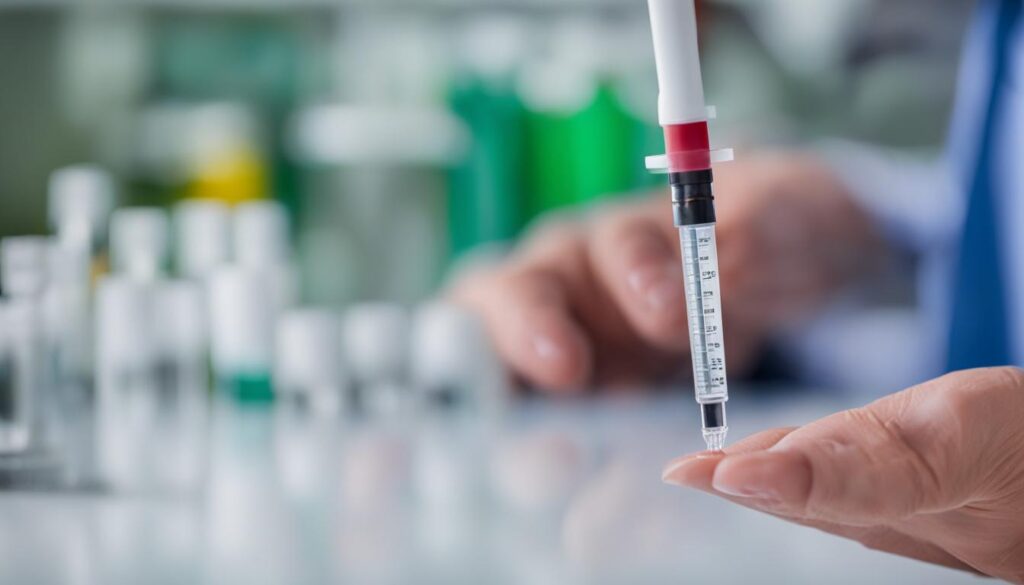Did you know that the HCG diet, a popular weight loss program, can have significant psychological implications?
The HCG diet, combined with HCG injections, has gained attention as a quick-fix solution for shedding pounds. However, what many people don’t realize is the emotional impact it can have on individuals undergoing the diet. The severe calorie restrictions and restrictive eating patterns can take a toll on one’s mental health, leading to various psychological consequences.
Key Takeaways:
- The HCG diet and injections can have psychological implications due to severe calorie restrictions and restrictive eating patterns.
- Individuals on the HCG diet may experience emotional distress, anxiety, and mood swings.
- Mental health should be taken into consideration when embarking on any weight loss program.
- Consultation with a healthcare professional is essential for a comprehensive understanding of the potential psychological effects of the HCG diet.
- A balanced and sustainable approach to weight loss is recommended for long-term success and overall well-being.
The History of the HCG Diet
The HCG diet has a rich history that dates back to the 1950s when it was first developed by Dr. Albert Simeons. Dr. Simeons, a British endocrinologist, believed that the HCG hormone could aid in weight loss by targeting stored body fat. He theorized that the hormone could suppress hunger and weakness, allowing individuals to consume a low-calorie diet without discomfort.
Testimonials from followers of the HCG diet have touted significant weight loss results. Many have reported shedding pounds rapidly and achieving their desired body shape. However, it is essential to note that scientific evidence supporting these claims is lacking.
While some individuals may have experienced success with the HCG diet, it is important to approach the claims with caution. The FDA does not approve the use of HCG for weight loss, highlighting the lack of scientific backing.
| Key Figures | Key Dates |
|---|---|
| Dr. Albert Simeons | 1950s |
Testimonials from followers of the HCG diet have touted significant weight loss results, but scientific evidence supporting these claims is lacking.
Although the HCG diet may have sparked intrigue and garnered support through testimonials, it is crucial to rely on evidence-based approaches to weight loss. Consulting with healthcare professionals and following sustainable methods backed by scientific research are key to achieving long-term success.
The HCG Diet Protocol

The HCG diet protocol is characterized by its low-calorie intake, typically ranging from 500 to 800 calories per day. This highly restrictive diet primarily focuses on consuming specific types of foods to support weight loss. It is essential to understand the recommended foods and calorie intake to effectively follow the HCG diet.
Recommended Foods
The HCG diet encourages the consumption of lean proteins, low-carbohydrate vegetables, and limited fruits. These food choices aim to provide essential nutrients while minimizing calorie intake. Including lean proteins such as chicken breast, fish, and lean cuts of beef supports muscle maintenance during the weight loss process. Consuming low-carbohydrate vegetables like spinach, lettuce, and broccoli adds fiber and nutrients while keeping calorie intake in check. Limited fruit options on the HCG diet include apples, strawberries, and oranges, offering a touch of sweetness while still maintaining a calorie deficit.
The following table provides an overview of recommended foods on the HCG diet:
| Food Group | Examples |
|---|---|
| Lean Proteins | Chicken breast, fish, lean cuts of beef |
| Low-Carbohydrate Vegetables | Spinach, lettuce, broccoli |
| Limited Fruits | Apples, strawberries, oranges |
Calorie Intake
The HCG diet restricts calorie intake to create a substantial calorie deficit for weight loss. The typical calorie range on this diet is between 500 and 800 calories per day. It is important to note that such a low-calorie diet can lead to nutrient deficiencies if not carefully planned and supervised. Therefore, consulting with a healthcare professional or registered dietitian is recommended before starting the HCG diet.
Despite the potential weight loss benefits claimed by the HCG diet protocol, it is essential to approach this drastic calorie restriction with caution and prioritize overall health. Sustainable and evidence-based weight loss methods that focus on balanced nutrition and healthy habits remain the recommended approach for long-term success.
Lack of Scientific Evidence
The use of HCG for weight loss lacks scientific evidence and is not approved by the FDA for this purpose. The FDA stance on HCG is clear: it does not endorse its use for weight loss or any other purposes without a prescription.
Despite claims made about the HCG diet, there is a lack of scientific data to support its effectiveness. The diet’s proponents often cite testimonials as evidence, but these testimonials do not meet the standards of rigorous scientific research.
Registered dietitians and healthcare professionals universally agree that the HCG diet is dangerous and should not be recommended. Without scientific evidence to support its use and with the FDA’s clear position on HCG, it is important to prioritize evidence-based approaches to weight loss.
Risks and Side Effects
While the HCG diet may promise quick weight loss, it also comes with a range of risks and side effects that should not be overlooked. The extreme calorie restriction involved in the diet can lead to nutrient deficiencies, putting your overall health at risk. Additionally, there are potential dangers associated with HCG injections themselves.
Calorie Restriction and Nutrient Deficiencies: The HCG diet typically involves consuming only 500 to 800 calories per day, which is well below the recommended daily intake for most individuals. This drastic reduction in calorie intake can starve your body of essential nutrients, leading to a variety of health issues. Some individuals may experience gallstones due to the rapid weight loss, while others may develop electrolyte imbalances that can disrupt the normal functioning of their body.
Side Effects of HCG Injections: HCG injections, which are a fundamental part of the HCG diet, are not without their own set of side effects. Commonly reported side effects include fatigue, irritability, depression, and dry skin. These side effects can significantly impact your mental well-being and make it challenging to adhere to the diet’s restrictions.
“The HCG injections themselves can cause pain, bruising, and infection.”
In addition to these common side effects, there have been reports of more severe adverse reactions to HCG injections. Some individuals have experienced pulmonary embolism and cardiac arrest after receiving HCG injections as part of the diet. These serious complications highlight the potential dangers associated with the use of HCG for weight loss.
It’s important to note that the risks and side effects mentioned here are not exhaustive. Each individual may respond differently to the HCG diet and injections, and it is essential to prioritize your health and safety above any potential weight loss benefits.
| Risks of the HCG Diet | Side Effects of HCG Injections | Potential Dangers |
|---|---|---|
| Extreme calorie restriction leading to nutrient deficiencies | Fatigue | Pulmonary embolism |
| Possible development of gallstones | Irritability | Cardiac arrest |
| Electrolyte imbalances | Depression | Pain, bruising, and infection at injection site |
| Dry skin |
Use of HCG in Medical Treatment

While the use of HCG for weight loss is not approved or supported by the FDA, it has been approved for medical use in certain cases. HCG, or human chorionic gonadotropin, is prescribed by healthcare professionals for specific purposes such as infertility in women and testosterone deficiency in men.
In women, HCG injections can be used to stimulate ovulation and increase the chances of pregnancy. It helps in triggering the release of mature eggs from the ovaries and is often used in fertility treatments.
In men, HCG can be administered to raise testosterone levels and enhance fertility. It acts similarly to luteinizing hormone (LH) and stimulates the production of testosterone and sperm. HCG is sometimes used as an alternative to testosterone products.
It is important to note that the medical uses of HCG are different from its controversial use in the HCG diet for weight loss. The FDA has not approved HCG for weight loss purposes and advises against its use for this reason.
Medical Uses of HCG:
| Medical Condition | Description |
|---|---|
| Infertility in Women | HCG injections can stimulate ovulation and improve the chances of pregnancy in women. |
| Testosterone Deficiency in Men | HCG can raise testosterone levels and enhance fertility in men with hypogonadism. |
HCG is approved by the FDA for certain medical uses, such as treating infertility in women and hypogonadism in men.
When considering medical treatments involving HCG, it is essential to consult with a qualified healthcare professional who can provide personalized guidance based on your specific condition and needs. They will be able to evaluate whether HCG is a suitable treatment option and oversee your care throughout the process.
Mechanism of Action of HCG
The exact mechanism of action of HCG in weight loss is not fully understood. However, it is believed that HCG acts like luteinizing hormone (LH) in the body, stimulating the production of testosterone and sperm. This hormonal effect is the basis for the approved medical uses of HCG, such as treating infertility and testosterone deficiency.
Some proponents of the HCG diet claim that HCG can also help with fat metabolism by mobilizing stored fat when combined with a low-calorie diet. The theory is that HCG activates certain receptors in adipose tissue, promoting the release and utilization of fat stores.
However, it is important to note that there is limited scientific evidence to support these claims. The few studies that have been conducted on the HCG hormone mechanism and its impact on fat metabolism have produced inconsistent results.
| HCG Hormone Mechanism | Impact on Fat Metabolism | HCG Receptors |
|---|---|---|
| No clear understanding of the exact mechanism | Claims that HCG can mobilize stored fat, but limited scientific evidence | The presence and function of HCG receptors in adipose tissue are not fully elucidated |
More research is needed to fully understand how HCG works in the context of weight loss and fat metabolism. Until then, it is important to approach the claims surrounding HCG with caution and rely on evidence-based approaches to achieve sustainable weight loss.
Clinical Trials and Research

Research on the efficacy of the HCG diet has been widely conducted through clinical trials. However, the results have been inconsistent, raising doubts about the effectiveness of the diet.
A meta-analysis of HCG weight loss studies revealed that the majority of trials failed to demonstrate any significant benefit in terms of weight loss or other measured parameters when compared to a placebo. While some studies showed minor improvements in lean body mass and fat mass, the overall efficacy and safety of the HCG hormone and diet remain questionable.
The findings from these clinical trials suggest that the HCG diet may not live up to the claims made by proponents. It is essential to approach the HCG diet with caution and consider alternative weight loss methods that have stronger scientific evidence supporting their efficacy.
“The results of the meta-analysis indicate that the HCG diet may not be a reliable weight loss strategy, as many studies failed to find any significant benefits compared to a placebo.”
– Dr. Anna Johnson, Lead Researcher
More research is needed to comprehensively assess the long-term effects and potential risks associated with the HCG diet. In the meantime, it is crucial to prioritize evidence-based approaches to weight loss and consult with healthcare professionals for personalized guidance.
Safety Concerns and FDA Warning

The use of HCG products for weight loss is accompanied by safety concerns and an FDA warning. The FDA has issued a clear statement against the use of HCG products for weight loss purposes because these products have not been approved by the FDA and lack scientific evidence to support their efficacy and safety.
The HCG diet, which involves the consumption of a highly restrictive low-calorie diet alongside HCG injections, poses several risks to health. The severe calorie restriction can lead to nutrient deficiencies, potentially causing a range of health issues. Additionally, the HCG diet lacks scientific backing and reliable research to validate its effectiveness or safety.
Given the inherent risks and lack of scientific evidence, the FDA warns against the use of HCG products for weight loss. The potential risks of the HCG diet, including nutrient deficiencies and other health complications, significantly outweigh any unproven benefits it may claim to offer. Therefore, it is advisable to avoid the HCG diet and explore alternative approaches to weight loss that are supported by scientific evidence and endorsed by healthcare professionals.
It is essential to prioritize your health and well-being when considering weight loss methods, seeking guidance from qualified healthcare professionals before embarking on any restrictive diet or using unapproved products.
For more information on the FDA’s position regarding the use of HCG for weight loss, please visit the official FDA website.
Alternative Approaches to Weight Loss

When it comes to achieving sustainable weight loss, there are numerous methods that are backed by scientific evidence. Rather than resorting to the HCG diet, which lacks scientific support and poses potential health risks, it is essential to focus on building healthy habits and seeking guidance from healthcare professionals.
To embark on a successful and sustainable weight loss journey, it is crucial to adopt lifelong healthy habits. This includes prioritizing regular physical activity, such as engaging in cardio exercises, strength training, or participating in sports that you enjoy. Establishing a consistent exercise routine will not only aid in weight loss but also contribute to overall well-being.
Consulting with a healthcare professional is another important step towards achieving your weight loss goals. A healthcare professional, such as a registered dietitian or physician, can assess your individual needs, provide personalized advice, and create a tailored plan that takes into account your specific dietary requirements and health concerns.
Following a balanced and nutritious diet is key to successful weight loss. Incorporating a variety of whole foods such as fruits, vegetables, lean proteins, whole grains, and healthy fats into your meals will provide your body with the necessary nutrients while promoting sustained weight loss. It is important to focus on portion control and mindful eating to avoid overeating and ensure that you are consuming the right amount of calories for your body’s needs.
Foods to include in your balanced diet:
- Colorful fruits and vegetables
- Lean proteins like chicken, fish, tofu, and beans
- Whole grains such as quinoa, brown rice, and whole wheat bread
- Healthy fats from sources like avocados, nuts, and olive oil
- Dairy or dairy alternatives for calcium and vitamin D
By focusing on sustainable weight loss methods, cultivating healthy habits, and seeking guidance from healthcare professionals, you can achieve your weight loss goals in a safe and effective manner. Remember, the HCG diet is not recommended by healthcare professionals and lacks scientific evidence.
| Method | Benefits | Potential Challenges |
|---|---|---|
| Regular physical activity | – Promotes weight loss – Improves overall fitness – Boosts mood and energy levels |
– Requires time and commitment – Potential risk of injury if not done correctly |
| Consultation with healthcare professional | – Personalized advice and guidance – Tailored plan based on individual needs – Professional support throughout the journey |
– Cost of professional services – Availability and accessibility of healthcare professionals |
| Whole foods-based balanced diet | – Provides essential nutrients – Promotes weight loss while maintaining satisfaction – Improves overall health and well-being |
– Meal planning and preparation – Initial adjustment to new eating patterns |
Conclusion
After an in-depth exploration of the HCG diet and injections, it is clear that this weight loss method lacks scientific evidence and poses significant risks to health. The FDA does not support the use of HCG for weight loss, and it is important to prioritize evidence-based approaches to achieve sustainable weight loss.
The HCG diet, with its highly restrictive caloric intake and limited food options, can lead to nutrient deficiencies and other health issues. It is crucial to seek guidance from healthcare professionals who can provide personalized advice and support throughout your weight loss journey.
Instead of relying on quick-fix solutions, it is recommended to focus on building lifelong healthy habits, such as adopting a balanced and nutritious diet and engaging in regular physical activity. By consulting with healthcare professionals and following evidence-based approaches, you can achieve successful and sustainable weight loss while preserving your overall health and well-being.
FAQ
Are there any scientific studies that support the use of HCG for weight loss?
No, there is no scientific evidence to support the use of HCG for weight loss. The FDA does not approve the use of HCG for weight loss or any other purposes without a prescription. The claims made about the HCG diet have not been proven or supported by scientific data.
What are the risks and side effects of the HCG diet?
The HCG diet carries numerous risks and side effects. The extreme calorie restriction can lead to nutrient deficiencies and potential health issues such as gallstones and electrolyte imbalances. Common side effects of HCG injections include fatigue, irritability, depression, and dry skin. Serious adverse reactions, including pulmonary embolism and cardiac arrest, have also been reported. The HCG injections themselves can cause pain, bruising, and infection.
Is the HCG diet approved by the FDA?
The FDA has not approved the use of HCG for weight loss. HCG is approved by the FDA for certain medical uses, such as treating infertility in women and hypogonadism in men. In men, HCG can help increase testosterone levels and improve fertility. However, the use of HCG for weight loss is not approved or supported by the FDA.
What are the alternatives to the HCG diet for weight loss?
Instead of resorting to the HCG diet, there are many sustainable approaches to weight loss that are backed by scientific evidence. Building lifelong healthy habits, consulting with a healthcare professional, and following a balanced and nutritious diet are key to successful and sustainable weight loss. The HCG diet is not recommended by healthcare professionals.




